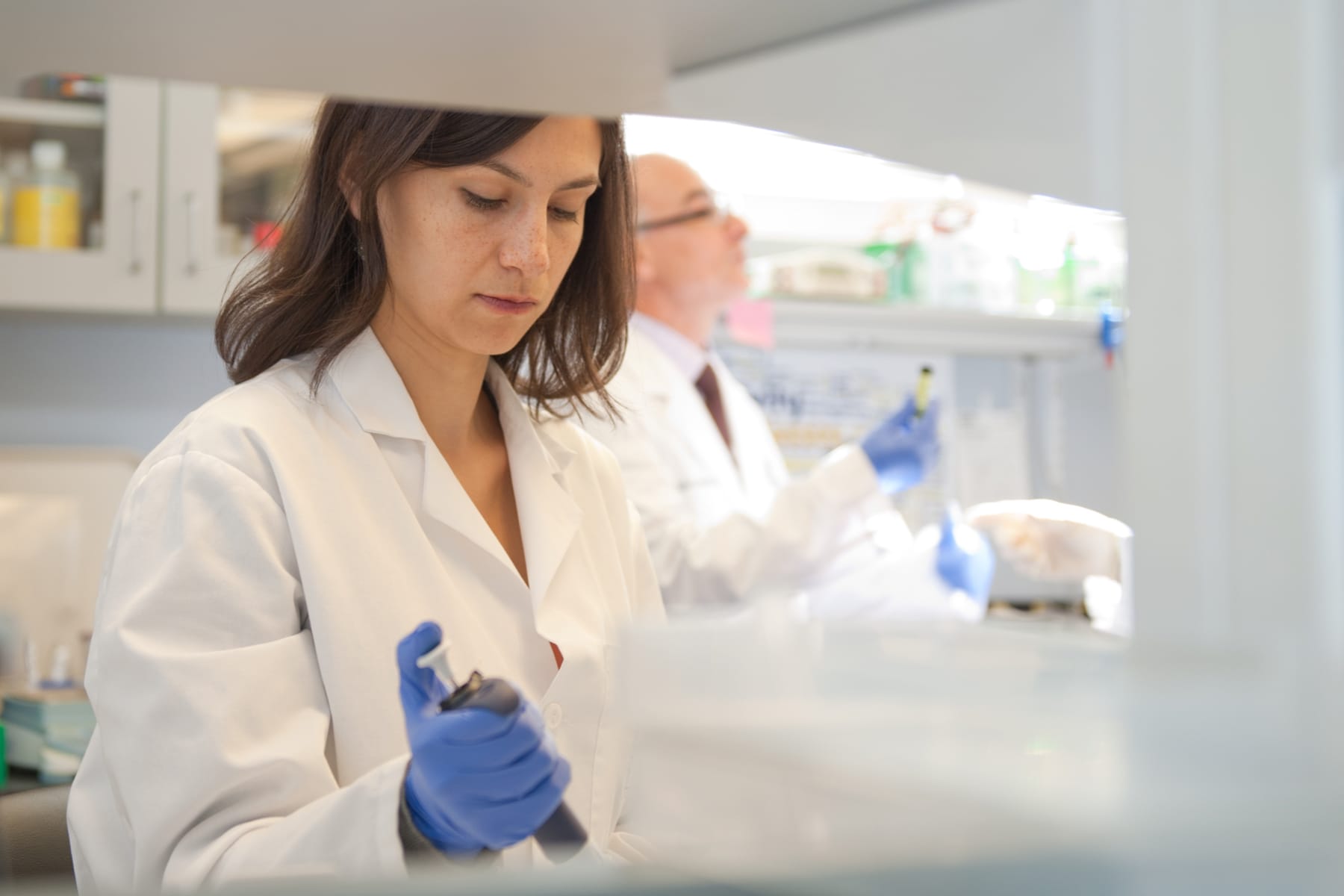
Academics
Our one-year Master of Science in Medical Health Sciences (MSMHS) program builds your knowledge of the basic sciences and provides you with an opportunity to conduct research.
On this page, find information on the MSMHS program's Highlights, Application & Aid, Who The Program Is For, Testimonials, and Curriculum.
Highlights
Our MSMHS program enhances your application to medical school, a PA program, and other allied health programs, helping it stand out among the thousands reviewed by admission officers. You'll gain the knowledge to improve your GPA, prepare for the program of your choice, and any required entrance exams, such as the MCAT, and pursue a research project of your choice. You will be part of a supportive campus environment with opportunities to participate in an exciting array of extra-curricular, clinical, research, and community service activities.
- Earn a master’s degree in one academic year, beginning in the fall.
- Conduct meaningful research with a faculty mentor. Topics include microbiology, ion channels, cancer, diabetes, Alzheimer’s, neuronal development, and obesity.
- Curriculum can be taken either online or on campus. Both cohorts take the same curriculum simultaneously.
- For linkage agreements with COM, PA, and dental programs, please go to the MS in Medical Health Sciences Admissions page and scroll down to Opportunities with Professional Degree Programs.
Application & Aid
Program Start: Fall
Program Length: 12 Months
Admissions Requirements & Deadline: View Admissions Information
Tuition & Aid: View Tuition & Aid Information
Application deadline and all the information you need to apply can be found on the MSMHS Admissions page.
Who The Program Is For
Future Physicians
Gaining admission to medical school is a highly competitive process. Our MSMHS program strengthens your application and provides unique advantages through linkage agreements with TUC’s College of Osteopathic Medicine (TUCOM) and TouroCOM Montana. TUCOM offers both guaranteed interviews and guaranteed acceptance opportunities, while TouroCOM Montana provides a guaranteed interview. More than half of MSMHS students who apply to TUCOM are accepted.
Future Physician Assistants
The MSMHS program can enhance your application to PA programs. TUC’s MSPAS/MPH program offers a guaranteed interview to two MSMHS students who earn a 3.0 GPA and meet all other requirements. Touro’s PA programs in Los Angeles and New York offer a guaranteed interview for those earning a 2.75 or better. Additionally, the MSMHS can benefit students who have already applied to Touro New York PA programs and have been denied admission or decelerated after matriculation.
Those interested in other health and science fields
The MSMHS offers a rigorous core curriculum in the biomedical sciences. This will serve as a strong foundation for any clinical or science-related position you seek. We have students who go into nursing, dentistry, biotechnology, research, teaching, and those who pursue a PhD.
Testimonials

Caroline Auxier, MSMHS, DO
“The patient population is incredible, offering plenty of opportunities to practice Spanish, and all the attendings are deeply committed. As students, we have a lot of autonomy and can engage meaningfully in patient care. Honestly, I couldn’t have ended up at a better place to rotate.”
Kwong.jpg)
Lily Kwong, MSMHS, DO
“As a prospective osteopathic physician, I anticipate interacting with individuals from different walks of life. I aspire to nurture an environment that bridges misunderstandings rather than erecting barriers. With this guiding principle and commitment to upholding my integrity, I am dedicated to cultivating a health care system that is not only compassionate but also inclusive for all.”
Curriculum
HSOC-601-0-Medical Biochemistry (3 units)
This course familiarizes students with clinically-relevant anatomy of the human body. The focus is on structural and functional relationships of anatomical structures. These relationships are presented utilizing both lecture and laboratory. The laboratory portion contains cadaver dissection and diagnostic imaging and focuses on spatial relationships, normal structure and normal variant structures, the relationships of organs and organ systems; also there are clinical correlations and consideration of gross pathology.
HSOC-602-0 Molecular Cell Biology (3 units)
The course studies cell and molecular biology as it applies to health and disease. The major topics covered will be cell and matrix structure, cell signaling and biophysics, histology of basic tissue types, molecular biology of DNA and RNA, cell cycle and cancer genetics, as well as biotechnology. Emphasis will be on understanding basic cell and molecular mechanisms in a normal healthy adult and how those mechanisms go awry during development of cancer.
HSOC-603-0 Neuroscience (3 units)
This medical neuroscience course is designed to provide a thorough understanding of the human nervous system. This course covers topic areas including neuroanatomy, neurohistology, neurophysiology, neurochemistry, neuroembryology, sensory systems and pathways, motor systems and pathways, clinical identification of specific neurological disorders and diseases, and neuroanatomical identification of nervous system lesions.
HSOC-604-0 Introduction to Research (2 units)
Students learn how research is conducted, analyzed, and communicated, via presentations by active research faculty and by active participation in journal club presentations. The course includes a biostatistics module in which students learn how to statistically analyze data with particular application to the biological sciences.
HSOC-605-0 Physiology 1 (3 units)
The course takes a systems-based approach to study the fundamental principles of medical physiology as it applies to health and disease. Physiology 1 covers nerve, cardiovascular, respiratory, and gastrointestinal physiology. Emphasis is on understanding basic physiological mechanisms in a normal healthy adult and is presented at the gross, cellular and/or molecular level. Where appropriate, descriptions of normal physiology are integrated with pathophysiological scenarios for emphasis and clinical relevance.
HSOC-600-0 Anatomy (4 units)
This course familiarizes students with clinically-relevant anatomy of the human body. The focus is on structural and functional relationships of anatomical structures. These relationships are presented utilizing both lecture and laboratory. The laboratory portion contains cadaver dissection and diagnostic imaging and focuses on spatial relationships, normal structure and normal variant structures, the relationships of organs and organ systems; also there are clinical correlations and consideration of gross pathology.
HSOC-606-0 Physiology 2 (3 units)
This course is a continuation of Physiology 1 from the fall semester. The course takes a systems-based approach to study the fundamental principles of medical physiology as it applies to health and disease. Physiology 2 will cover renal, endocrine and reproductive physiology. Emphasis is on understanding basic physiological mechanisms in a normal healthy adult and is presented at the gross, cellular and/or molecular level. Where appropriate, descriptions of normal physiology are integrated with pathophysiological scenarios for emphasis and clinical relevance.
HSOC-607-0 Immunology and Infectious Disease (3 units)
This course is divided in three sections. The first section explains the basis of innate and acquired immunity at the molecular, cellular, organ and systemic level. Students learn how to analyze developmental aspects of immunity and how the immune system responds to pathogens. The second section covers clinical immunology and how immune system mechanisms can cause disease. Students learn mechanisms of immunopathogenesis, and also how the immune system can be harnessed to treat cancer. The third section will focus on infectious diseases. This section includes an introduction to medical microbiology and a description of infectious agents. The course covers medically relevant microbes (bacteria, viruses, fungi and parasites), and major mechanisms of their transmission, pathogenesis along with management of the presented infectious agents. Students learn how to characterize the molecular and structural features of microbial organisms and relate these structures to their functions and laboratory diagnosis as well as their roles in microbe-host interaction.
HSOC-608-0 Pharmacology (3 units)
The course covers selected topics in pharmacology, including general principles, central nervous system and peripheral nervous system pharmacology, renal and GI pharmacology and cardiovascular pharmacology. Emphasis is on understanding basic principles of pharmacology, different classes of pharmacologic agents and their sites and mechanism of action, along with indications for use and contraindications or serious side effects arising from use.
HSOC-609-0 Research Internship (3 units)
Students participate in a semester-long research project with a faculty mentor. The research project culminates in a final paper and a final poster presentation. In addition, methods of scientific presentation and data analysis are reinforced via student journal club presentations, lectures by faculty mentors and a short biostatistics module.
